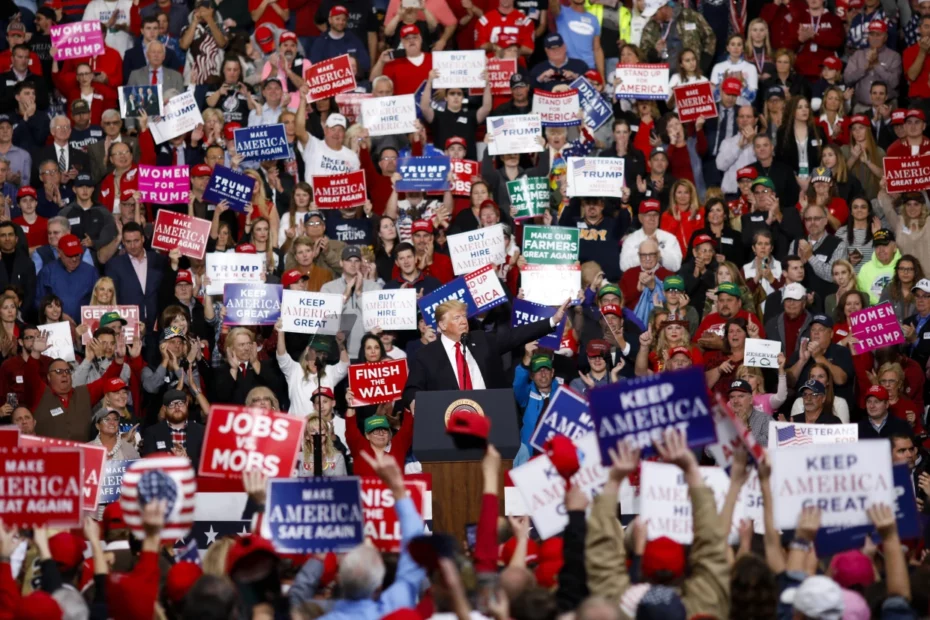Last updated on November 15th, 2023 at 05:01 am
“Trumpism” is a term that emerged during and after the presidency of Donald Trump. It refers to a set of political ideologies, beliefs, and practices that are associated with Trump and his supporters. Trumpism is characterized by a populist and nationalist agenda, with a focus on issues such as immigration, trade, and national security. It also emphasizes a strong executive branch, with limited government oversight and intervention. Trumpism has been described as a far-right movement by some commentators, but its exact political leanings are subject to debate. Supporters of Trumpism tend to view it as a response to what they see as the failures of mainstream politics and the need for a more direct and forceful approach to governance. Critics of Trumpism, on the other hand, see it as a dangerous and divisive force that threatens the stability of democratic institutions.
The term Trumpism has also been applied to other politicians and movements outside the United States who share some of the same political beliefs and strategies as Trump and his supporters. These include national-conservative and national-populist movements in Europe, South America, and Asia. Politicians have been labeled as allies of Trump or Trumpism due to their similarities in political ideologies, social emotions, and style of governance. For example, Jair Bolsonaro of Brazil has been compared to Trump due to his nationalist and populist rhetoric, while Boris Johnson of the United Kingdom has been compared to Trump for his willingness to challenge establishment politics and his controversial comments. Other politicians, such as Marine Le Pen of France and Viktor Orbán of Hungary, have been associated with Trumpism due to their anti-immigrant stances and focus on national sovereignty.
Who are Donald Trump’s supporters?
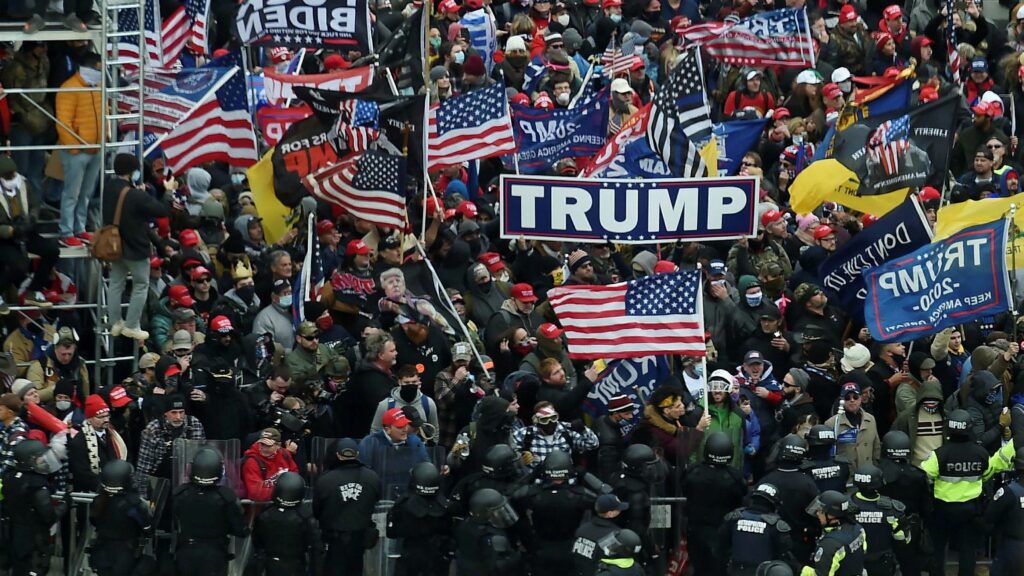
Donald Trump’s supporters are a diverse group of people with different backgrounds, political beliefs, and motivations. They include conservative Republicans, independents, and some Democrats who are attracted to Trump’s populist message, anti-establishment rhetoric, and promises to “Make America Great Again.” Some of Trump’s supporters are concerned about immigration, job losses, and economic insecurity, while others support his pro-life stance, his commitment to the Second Amendment, and his “America First” foreign policy.
During the 2016 presidential campaign, Trump attracted significant support from white, working-class voters in rural and rust-belt areas who were frustrated with the political and economic status quo. Trump’s base has also included evangelical Christians, who appreciate his conservative stance on social issues, and members of the military and law enforcement communities, who respect his tough-on-crime rhetoric.
Despite the controversy surrounding his presidency, Trump continues to maintain a loyal base of supporters who view him as a strong and effective leader who is willing to take on the establishment and fight for their interests. However, it is important to note that not all Republicans or conservatives support Trump and his divisive rhetoric and actions have also led to widespread opposition and criticism.
These are some celebrities who have expressed support for Donald Trump:
- Trace Adkins: Performed the national anthem at the 2020 Republican National Convention after Vice President Mike Pence’s speech.
- Roseanne Barr: Expressed empathy for Trump and wore a “Trump 2020” baseball cap, and defended him against accusations of racism.
- Dana White: UFC president who spoke at a Trump rally in February 2020 and appeared at the 2020 Republican National Convention.
- Herschel Walker: Businessman and former NFL athlete who spoke at the virtual 2020 Republican National Convention and talked about his long friendship with Donald Trump.
- Jack Nicklaus: Golf champ who shared his endorsement on Twitter, saying Trump has been “more diverse than any President I have seen.”
- Scott Baio: An actor who supported Mr. Trump in 2016, gave a prime-time speech at that year’s Republican National Convention, and appeared in an interview on the official website of the 2020 campaign.
- Antonio Sabato Jr: Former model and “Melrose Place” actor who supported Trump at the 2016 Republican National Convention and complained of losing job opportunities because of his political beliefs.
- Diamond and Silk: Online video stars are known as Lynnette Diamond Hardaway and Rochelle Silk Richardson, who appeared with then-Republican presidential candidate Donald Trump at an Iowa rally in 2016 and still count themselves as loyal supporters.
- Dennis Quaid: Actor who said in April 2020 that Trump is doing a good job trying to get the American people what they need and hold the economy together.
- Ted Nugent: Rocker who has supported Trump and is selling trucker caps with a GOP-positive message for his 2020 re-election.
- Jon Voight: Actor who said in a July 22 video statement that “we must vote to help keep President Trump in office, so he can carry the torch for this land of the free.”
- Kirstie Alley: Actress who has expressed support for Trump and disdain for Joe Biden on her Twitter account.
- Carrie Prejean Boller: The former Miss California USA has long supported Mr. Trump this year, she counts herself as an advisory board member of the political group Women For Trump.
Why do people support Donald Trump?
Indeed, people’s motivations for supporting a political figure like Donald Trump can be complex and diverse. Some may genuinely believe that he is the best candidate to lead America based on his policies, personality, or leadership style. Others may be drawn to his unconventional approach to politics or his ability to tap into and amplify their frustrations with the status quo.
However, it’s also worth noting that not all of Trump’s supporters fall neatly into these two categories. Some may have initially been drawn to his candidacy out of curiosity or a desire for change, but then become more invested in his political vision as they learned more about his policies and rhetoric.
Moreover, it’s important to recognize that people’s political beliefs and motivations are shaped by a variety of factors, including their personal experiences, cultural values, and ideological beliefs. Thus, it’s not always accurate to reduce people’s support for a political figure to a simple binary between earnest belief and giddiness at the spectacle.
People support Donald Trump for a variety of reasons, including his political policies, leadership style, and persona. Here are some of the key factors that have contributed to his support:
- Economic policies: Many of Trump’s supporters believe that his economic policies, such as tax cuts and deregulation, have led to job creation and economic growth. They also support his protectionist trade policies, which aim to keep jobs in America and prevent the outsourcing of jobs to other countries.
- Anti-establishment stance: Trump’s supporters appreciate his willingness to challenge the political establishment and the media. They see him as a political outsider who is not beholden to special interests or the traditional power structures of Washington, D.C.
- Strong leadership: Trump’s supporters admire his strong leadership style and his willingness to take decisive action, particularly in the areas of national security and law enforcement. They appreciate his tough rhetoric on issues like immigration and terrorism.
- Persona: Trump’s supporters are drawn to his persona as a successful businessman and celebrity. They see him as a strong and confident leader who speaks his mind and is not afraid to take on his opponents.
- Social and cultural values: Many of Trump’s supporters are motivated by social and cultural issues, such as opposition to abortion and support for traditional marriage. They also support his stance on immigration and his efforts to limit illegal immigration.
The Impact of Donald Trump on his supporters:
Donald Trump’s election as President of the United States in 2016 was a historic moment, as he became the first person without government or military experience to win the presidency. His presidency was marked by several unusual and unconventional actions, both in his approach to governing and in his style. He used his presidential platform to criticize a wide range of perceived adversaries, including the news media, members of his administration, elected officials from both parties, and foreign leaders. His prolific use of social media, including Twitter, provided an unfiltered window into his thinking on a range of issues.
Despite his unconventional approach, Trump’s policy record included significant changes at home and abroad. He achieved several conservative victories domestically, including the largest corporate tax cut in history, the rollback of numerous environmental regulations, and a transformation of the federal judiciary. In foreign policy, he pursued a more isolationist approach, withdrawing from several multilateral agreements and imposing strict new immigration restrictions. He also pursued a more confrontational stance with China, initiating a trade dispute as part of an effort to address perceived imbalances in the global economic system.
While the full impact of Trump’s presidency on American society and politics remains to be seen, there have already been significant shifts in attitudes and behaviors. Pew Research Center has conducted some studies to assess the impact of Trump’s presidency and has identified several societal trends that accelerated or emerged during his tenure. These include shifts in attitudes toward immigration, race, and gender, as well as changes in the way Americans consume news and information. While the full implications of these trends are not yet clear, they suggest that Trump’s presidency has left a lasting impact on American society and politics.
Trump’s use of social media and its influence on his supporters:
The emergence of social media has led to a new form of political communication, where popularity and influence are closely related. Trump’s hyper-active social media presence has set a precedent for other politicians to follow in terms of using social media to connect with voters. By tailoring campaigns specifically to social media, candidates can target voters in particular regions and create fine-tuned patterns to increase their impact. The constantly trending nature of social media reinforces a strong online influence for politicians who maintain an active presence. Overall, the modern political sphere is heavily influenced by social media, and all politicians must account for this in their campaigns.
Trump, the first Twitter-based President:
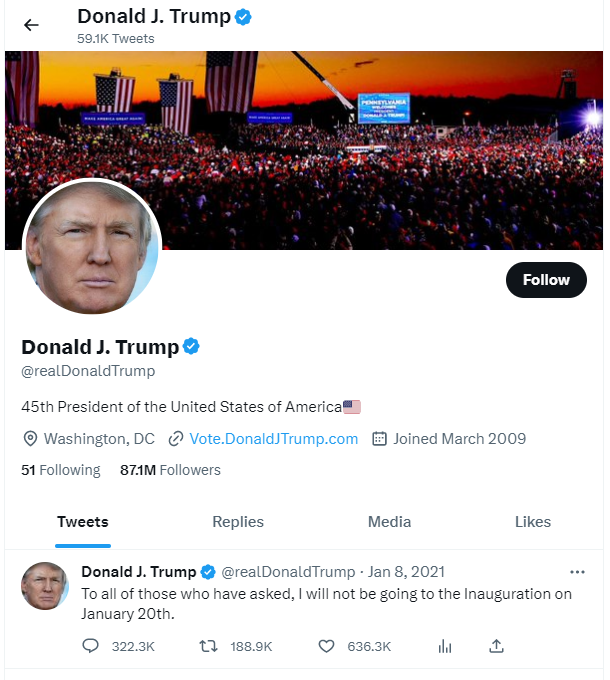
The success of Trump’s presidency owes a lot to his strategic use of social media, particularly Twitter. While his posts may seem senseless individually, they are collectively incredibly shareable and have allowed him to reach a wider audience than traditional political advertising methods would have allowed. Trump’s active online presence is not just definitive of his presidency but is likely to shape and inspire subsequent national elections as long as social media remains an important platform for political communication. While Trump may not have been successful in the political realms that traditionally shape the presidency, his ability to navigate the modern globalized world through social media has contributed to his overall success. His last tweet was reported on Twitter on 8 Jan 2021 after being banned but he is currently active on Truth Social.
Understanding the “America First” ideology of Trump’s supporters:
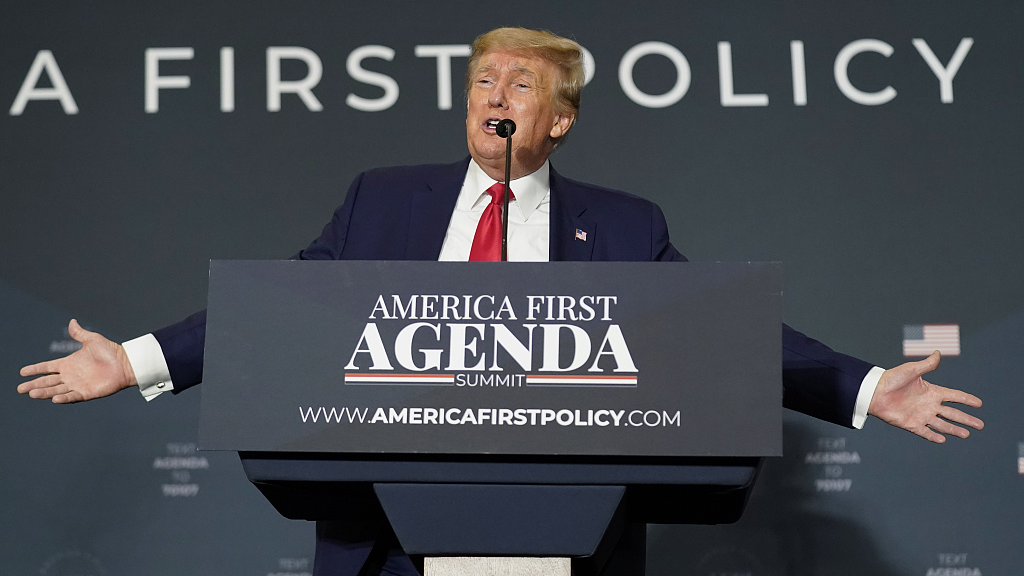
Trump’s use of the phrase “America First” is not new, but has political baggage dating back nearly a century. The sentiment of staying out of foreign affairs has existed since George Washington’s farewell address, but it wasn’t until after World War I that the modern version of isolationism gained traction. President Wilson’s push for international cooperation was rejected by the Senate in 1919, and some saw America’s isolationist stance as the reason for its prosperity in the following years. The slogan “America First” gained popularity with Chicago’s mayor, William Hale Thompson, in 1927, who supported the establishment of America First Associations and promised to show English leaders asking for economic help “where to get off.” The phrase would soon be put to the test.
The “American Dream Plan” is President Trump’s effort to promote prosperity and opportunity for Hispanic Americans to achieve the American Dream. The plan is based on four principles, which are to promote a thriving economy, education opportunities for all, preserve freedom, and support faith, family, and community. The plan includes policy promises that the President has already delivered for the Hispanic American community, such as expanding the economy, offering school choice, defending constitutional rights, combating socialism, and expanding quality healthcare options.
The Role of the Republican Party in Supporting Donald Trump:
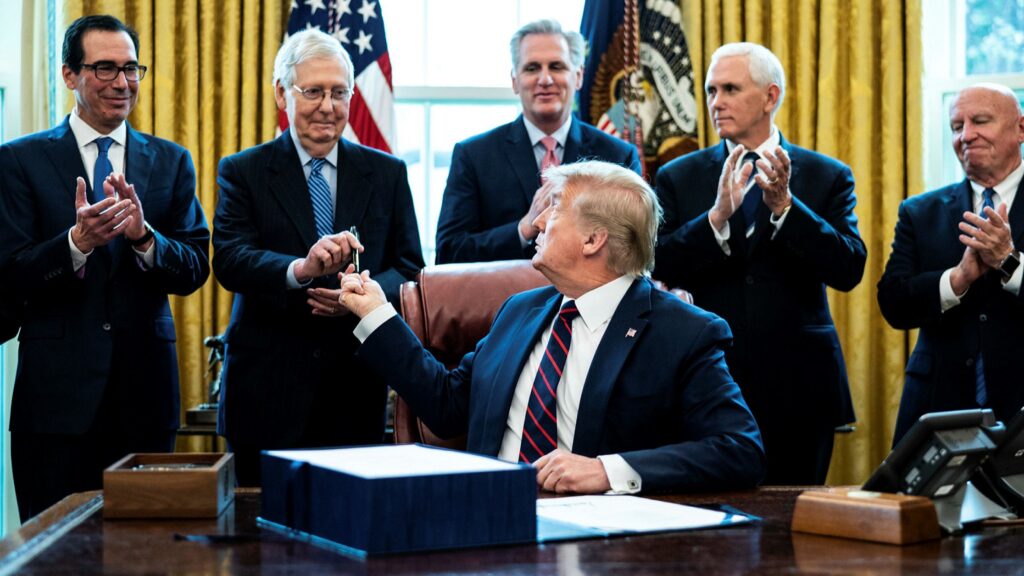
The Republican Party played a crucial role in supporting Donald Trump throughout his presidency, particularly during his 2020 re-election campaign. Despite initial reluctance among some party leaders to fully embrace Trump, many ultimately rallied behind him and his agenda. Trump’s loyal base of supporters also played a significant role in influencing the party’s direction and messaging.
During Trump’s presidency, the Republican Party largely fell in line with his policies and messaging, which often included controversial and divisive rhetoric. The party defended Trump against impeachment and investigations and supported his efforts to roll back regulations, cut taxes, and appoint conservative judges.
In the lead-up to the 2020 election, the Republican Party threw its full support behind Trump’s re-election campaign, with the party platform effectively becoming a reflection of Trump’s agenda. Many party leaders, including Senate Majority Leader Mitch McConnell, openly praised Trump and his policies.
However, Trump’s controversial actions, including his handling of the COVID-19 pandemic and his baseless claims of election fraud, ultimately led to a rift within the party. Some Republicans, including high-ranking officials such as former Vice President Mike Pence and Senate Minority Leader Mitch McConnell, broke with Trump in the aftermath of the January 6th insurrection at the U.S. Capitol.
Despite this division, the Republican Party remains deeply connected to Trump and his base of supporters, with many still actively promoting his policies and worldview. Trump’s continued influence over the party is likely to shape its direction for years to come.
The relationship between Trump’s supporters and the media:
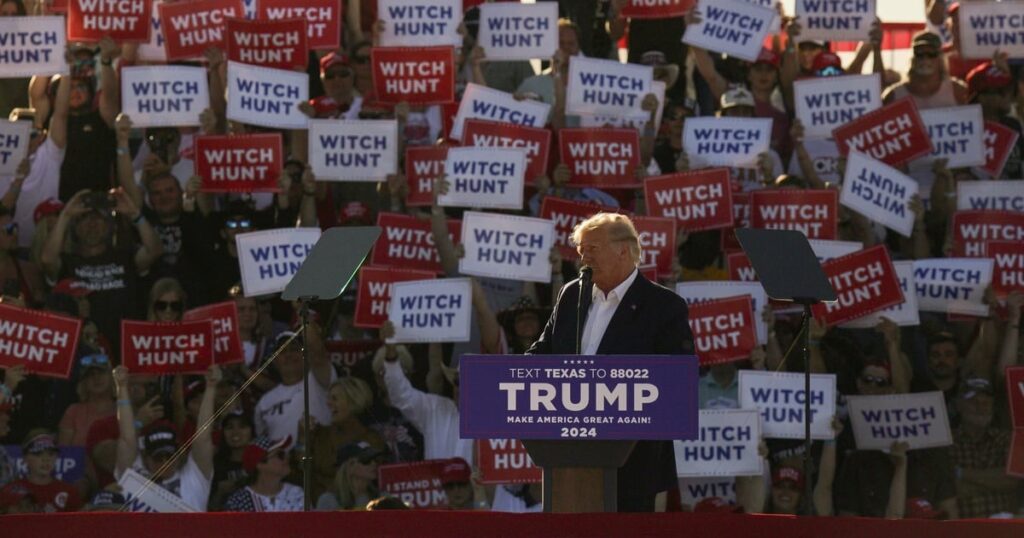
The Republican Party played a crucial role in supporting Donald Trump throughout his presidency, particularly during his 2020 re-election campaign. Despite initial reluctance among some party leaders to fully embrace Trump, many ultimately rallied behind him and his agenda. Trump’s loyal base of supporters also played a significant role in influencing the party’s direction and messaging.
During Trump’s presidency, the Republican Party largely fell in line with his policies and messaging, which often included controversial and divisive rhetoric. The party defended Trump against impeachment and investigations and supported his efforts to roll back regulations, cut taxes, and appoint conservative judges.
In the lead-up to the 2020 election, the Republican Party threw its full support behind Trump’s re-election campaign, with the party platform effectively becoming a reflection of Trump’s agenda. Many party leaders, including Senate Majority Leader Mitch McConnell, openly praised Trump and his policies.
However, Trump’s controversial actions, including his handling of the COVID-19 pandemic and his baseless claims of election fraud, ultimately led to a rift within the party. Some Republicans, including high-ranking officials such as former Vice President Mike Pence and Senate Minority Leader Mitch McConnell, broke with Trump in the aftermath of the January 6th insurrection at the U.S. Capitol.
Despite this division, the Republican Party remains deeply connected to Trump and his base of supporters, with many still actively promoting his policies and worldview. Trump’s continued influence over the party is likely to shape its direction for years to come.
The impact of the January 6th Capitol riot on Trump’s supporters:
The American public’s reactions to the deadly riot at the U.S. Capitol on January 6, 2021. Americans expressed shock, horror, and anger, there were significant partisan divides over the event’s key aspects. Republicans were more likely than Democrats to express doubts about who was behind the riot, with nearly one-in-five Republicans suggesting that the destruction wasn’t instigated by Trump supporters. Additionally, Republicans were divided on whether then-President Donald Trump bore responsibility for the actions of some of his supporters that day. Around half of Republicans and GOP leaners said Trump either bore a lot or some responsibility for the riot, but nearly as many said he bore no responsibility at all. Americans were deeply divided by party over whether it would be better for the country for Trump to be removed from office in the days after the riot. at last, Republicans became less open to intraparty criticism of the former president in the months after the riot.
Examining the Future of Trumpism and its Implications for the Republican Party:
Donald Trump received a significant number of votes in the 2020 presidential election. This indicates that the appeal of his brand of populism and Republican policies have not diminished among a significant portion of the American electorate.
The question of whether the Republican Party will continue to embrace Trumpism or move towards a more traditional conservative platform remains to be seen. The party may view its loss in the 2020 election as a result of external factors, such as the pandemic, rather than a rejection of its policies. In this scenario, the party may be less inclined to change course.
However, the emergence of a potential alliance between traditional and populist conservatives may indicate a shift towards a more unified party platform. The outcome of the 2024 Republican nomination contest will be an important factor in defining the direction of the party going forward.
Overall, the future of the GOP is uncertain and will be influenced by a variety of factors, including the outcome of future elections, the impact of current events, and the ideological leanings of party leaders and voters. There is a significant divide within the Republican Party between those who embrace Trumpist populism and those who reject it in favor of a more traditional conservative platform. The 2024 Republican nomination contest will likely be a reflection of this internal struggle.
Senator Marco Rubio’s shift toward populism and his emphasis on a multiethnic, working-class coalition may indicate a broader trend toward polished populism within the party. This approach may seek to retain Trump’s policies while distancing the party from his controversial personality.
On the other hand, former U.N. Ambassador Nikki Haley’s rejection of Trump’s leadership and her call for the party to move beyond his influence represents an opposing trend within the party. The outcome of the nomination contest will likely hinge on the balance of power between these two factions.
Regardless of the outcome, it seems likely that the GOP’s identity will continue to evolve in the coming years as the party grapples with internal divisions and seeks to establish a clear direction forward.
